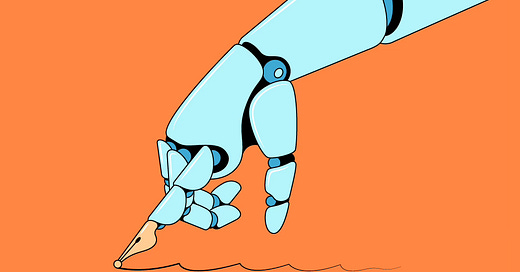Like many writers, I was anti-AI. Along with Zadie Smith, Margaret Atwood, James Patterson, Stephen King and 191,000 other writers, in 2023 I discovered that some of my books had been used, without permission or payment, to train artificial intelligence (AI), specifically large language models (LLM).
I felt vaguely threatened – I wasn’t sure what would happen next, but I assumed publishers would find a way to use AI, and I’d be paid even less than I am now.
I even wrote a post about the threat AI poses to writers as one of my first Substack articles. I did, though, point out that AI was here to stay. It would be nice if we were paid for our work, I said, but we had to adapt to the new technology or we would, as one person posted on X, lose our jobs, not to AI, but to someone using AI.
So I enrolled in a couple of courses on AI taught by Dr Jules White, a Professor of Computer Science at Vanderbilt University, including this one on Prompt Engineering Specialisation.
AI is still at a relatively early stage. There is a danger it might replace us as writers in the future. But right now, it’s possible to use AI to help you become a better writer. The way to do this is to understand how to write ‘Prompts’ (these are the instructions you give to ChatGPT or other LLMs).
“It's not about taking away our thinking, our creativity. It's about amplifying it, it's about supporting it, it's about building something better. It's about creating an exoskeleton for our minds that allows us to achieve things that we couldn't do before.”
Dr Jules White, Vanderbilt University
Here are my ten suggestions for how to use AI to become a better writer with suggested prompts1:
1. Brainstorm
Do you ever wish you had a writing buddy or group on hand to brainstorm ideas with? Now you have one in your pocket, that has already read more books than anyone else you’ve ever met.
Prompt: I'm working on X (a fantasy novel about a world without water). Act as a member of a creative writing group and brainstorm ideas with me. For each idea I share, generate five more.
2. Create creative writing prompts
These are the kind of ‘prompts’ we’re more familiar with. Suppose you don’t know what to write next in the novel you’re working on. Or you need a creative writing or journaling prompt to get you started. You can ask ChatGPT. The key is to make your prompt quite specific.
Prompt: I want to write X (a piece of flash fiction) of X (500 words) on the topic of X (loss). Please suggest five creative writing prompts focusing on X (emotional connection).
3. Look for an agent
I’m frequently asked by aspiring writers how one finds an agent. My advice is to look at authors who write books that are similar to yours and then find out who their agent is. Most writers thank their agent in the acknowledgements. They may also mention who they’re represented by on their social media platforms, and many agents or agencies list their authors on their websites. It would only take ChatGPT seconds to do all of this cross-checking for you2.
Prompt: I write X (novels) for X (adults / YA) in (genre). My X (novels) are most similar to X, X and X (add names of your favourite contemporary authors in your genre). Please search for agents in (location) who represent or want to represent authors like me and provide their agencies, contact details and websites.
4. Create a pitch
If you’re anything like me, or most authors I know, you’re good at the actual writing, but the selling part is a lot harder. When approaching an agent or a publisher or when self-publishing, it’s good to have:
an elevator pitch (1-3 sentences about your book),
a tag line (a line that sums up the mood of the book and hooks readers. Think of Jaws: It’s not safe to go in the water),
a synopsis (one-page describing the book or play’s plot),
a blurb that would go on the back cover and be used to entice the reader to pick it up and hopefully buy it.
Prompt: Please create an elevator pitch of up to three sentences to summarise my X (novel’s plot) for (an agent / publisher / readership). The tone should be X (suspenseful and intriguing). Here it is: “(add your description here, up to 2000 words).”
5. Summarise research
LLMs are good at synthesising information and then paraphrasing it. You can ask ChatGPT to summarise your research notes for you so that the salient points are sensibly covered.
Prompt: Please read X (your notes) and create a X (300 word) summary in a tone suitable for X (academic audience).
6. Proofread
In an ideal world, we would hire copy editors – and thank goodness publishers still do. But you can improve your chances of being taken seriously by agents and publishers by showing them well edited work.
You can ask ChatGPT to proofread your work (up to 2000 words at a time, at present). It’s important to specify what type of grammatical changes you want, as well as the intended audience.
Prompt: Please proofread my X (novel chapter). The intended audience is X (YA readers of fantasy). Please use X (the Oxford Style Guide to Punctuation) and X (British) spelling. Make any changes clear and explain their need. Remember to keep my narrative voice / style.
7. Make suggestions
If you’ve asked ChatGPT to proofread something, you can always follow this up with a prompt such as:
After proofreading my story, list three specific suggestions for improvement, focusing on pacing, character development and tone.
My advice would be to treat this feedback like any feedback you might receive from a writer’s group. It might be very useful!
On the other hand, the person or LLM giving you feedback might have misunderstood the genre you’re writing in, or your audience, and / or what you personally are trying to achieve in your writing.
For example, ChatGPT said of my memoir, “I love it, but you could add more dialogue to bring this section to life.”
Well, I could add more dialogue, but how authentic would it be for my five-year-old self to remember entire conversations verbatim? On the other hand, if I hadn’t put any dialogue in, then this would have been a good point.
8. Create publicity material
Another aspect of writing that many of us struggle with is promoting our work – writing blogs for book bloggers and posts for social media, for instance.
My advice would be to use this as a starting point to save you time, and then customise and revise the article so that it’s in your own words with your unique voice.
Prompt: Using the notes below, draft a 400-word blog post promoting my novel to fantasy readers. Include three headline options. (And then add your notes to the Chat).
9. Create illustrations
Thankfully, most publishers are still hiring illustrators most of the time. However, the average writer can’t afford to pay several hundred pounds for an illustration.
So if you need an illustration to give a publisher an idea of the kind of picture you want them to create, or a drawing for a promotional article, you can ask ChatGPT to help.
In this case, I would switch the LLM to one specifically for illustration, such as DALL-E.
Prompt: Please create a X (photo, illustration) for X (my book for children) in X (landscape or portrait) aspect ratio. Specify what style (pen and ink, watercolour, colourful, pastel, muted and so on), and the content of the image.
“Create an illustration for a children’s book about a talking squirrel. The style should be colourful and whimsical, inspired by watercolour paintings."
ChatGPT’s example.
10. Write
You will have noticed by now that I haven’t suggested you ask ChatGPT to write anything creative. Almost everything I’ve read that ChatGPT has written for me so far has been bland and clichéd, and helpful only as a starting point.
But have a look at Ghosts by Vauhini Vara. Vara wanted to write about the death of her sister, but was unable to find the words.
“We were driving home from Clarke Beach, and we were stopped at a red light, and she took my hand and held it. This is the hand she held: the hand I write with, the hand I am writing this with. She held it for a long time. I looked at our hands, hers so much paler than mine. She was still holding my hand when the light turned green. I didn’t want her to let go.
I wanted her to hold my hand for the rest of my life.”
ChatGPT writing Ghosts for Vara
The final piece Vara wrote with the help of GPT 3.0 is heart-breaking. The LLM only wrote one line of it.
But arguably, without AI, Vara would have written nothing at all.
Side note
I asked ChatGPT what it thought of my list. It wrote, “Your prompts are clear, actionable, and tailored for writers. However, some can be refined for greater precision and ease of use.”
So I refined them where it seemed appropriate, apart from suggestion no. 10. Write.
ChatGPT commented:
“Acknowledge the iterative process with AI. For example: Generate a draft opening paragraph for a sci-fi story about time travel, based on a sample of my writing style. Then, refine it based on my feedback."
And:
“Other possible additions:
Language translation: For writers aiming to reach an international audience or those working on multilingual texts.
Character development: AI could help brainstorm character backstories or traits to enrich storytelling.”
Dr Sanjida O’Connell has had four non-fiction books, and eight novels published. She writes psychological thrillers as
. Bone by Bone, The Stolen Child, My Mother’s Secret and One Year Later were published by Corvus Books; The Divide was published in The Book of Bristol by Comma Press, and The Beautiful Game in The Perfect Crime, was published by Harper Collins.Sanjida has been shortlisted for the BBC Asia Awards, the Betty Trask Award for Romantic Fiction, the Daily Telegraph Science Writer's Award, Asian Woman of the Year, highly commended for BBC Wildlife Magazine's Award for Nature Writing, long listed for a Crime Writers’ Association Steel Dagger, shortlisted for a CWA Short Story Dagger and has won a CWA Short Story Dagger.
She writes a Substack called
on the craft of writing, and is also serialising a nature memoir, Wilderness: In Search of Belonging, about growing up dual-heritage in rural Britain, and rewilding a patch of land in Somerset on her Substack.I’ve been using a paid account for ChatGPT. You can create a free account. However, if you become a paid subscriber, you’ll have access to newer and faster AI systems. Whatever system you choose, you may want to change the settings so that your conversation is not shared with the rest of the LLM you’re using.
Always remember to check if a factually-based answer is true and hasn’t been ‘hallucinated’ by the AI system.









this is such a helpful article, demystifying AI for those of us who still feel afraid, and pointing out how useful it can be. I'll definitely be referring back to it
I'm running a workshop on Saurday about publishing for beginner writers. I have heard rumours that some publishers won't work with writers that have used AI for their work - do you think this is true or is it just generative AI and how will they know one way or another??
I know there's no easy answer to this...!